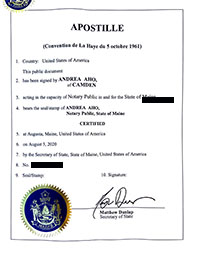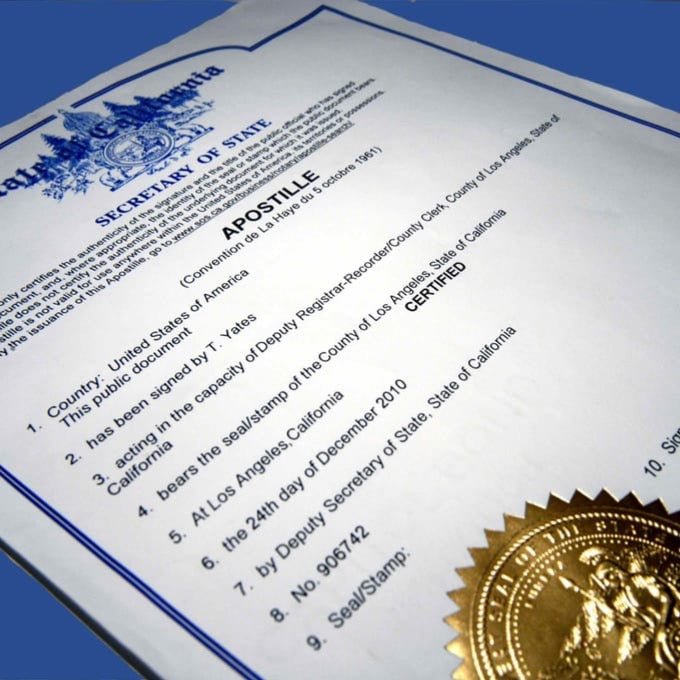Apostille Houston Solutions-- Legislate Your Papers effortlessly
Apostille Houston Solutions-- Legislate Your Papers effortlessly
Blog Article
Understanding the Apostille Refine: A Comprehensive Overview to International Record Verification
Navigating the elaborate landscape of worldwide file verification can be daunting without a clear understanding of the apostille process. This overview diligently describes the needed actions, from identifying which files need qualification to submitting them for verification by the Competent Authority. Comprehending the relevance of an apostille and identifying potential mistakes, such as incomplete submissions and language obstacles, can substantially streamline the verification trip. What precisely specifies an apostille, and why is it so critical for documents predestined for Hague Convention nations? These inquiries form the foundation of our expedition into this necessary lawful treatment.
What Is an Apostille?
An apostille is a main qualification that confirms the credibility of a record for usage in one more nation. This qualification, provided by a designated authority in the nation where the record came from, guarantees that the file is acknowledged as valid and legitimate in the international sector. The procedure of acquiring an apostille involves numerous actions, including the verification of the record's trademarks, seals, and stamps by suitable governmental bodies.
The apostille functions as a worldwide acknowledged form of verification, enabled by the Hague Convention of 1961. This treaty, officially referred to as the Hague Convention Eliminating the Demand of Legalisation for Foreign Public Documents, systematizes the process of document qualification among participant nations. The apostille itself is a standardized certificate which contains particular details, such as the providing authority, the country of beginning, and the date of issuance.
It is necessary to keep in mind that not all documents are qualified for an apostille. Commonly, public files like birth certifications, marriage licenses, court orders, and instructional diplomas get this certification. Exclusive files, such as contracts and contracts, may call for notarization and added steps to certify.
Significance of Apostille
Recognizing what an apostille is sets the phase for appreciating its value in worldwide dealings. houston tx apostille. An apostille, basically a form of qualification issued by a marked authority, validates the credibility of a document for usage in foreign countries that are signatures to the Hague Apostille Convention. This standardized process removes the need for additional legalisation by embassies or consular offices, thus improving international transactions
It guarantees the integrity and approval of necessary records-- such as birth certifications, marital relationship licenses, and instructional diplomas-- throughout borders. For services, it assists in the smooth conduct of worldwide profession, mergers, and purchases by supplying a relied on technique of paper verification.
Furthermore, an apostille improves legal safety and security and compliance. Federal governments and establishments can with confidence count click on the authenticity of files bearing an apostille, reducing the risk of scams and misstatement. Thus, the apostille acts as a vital tool in advertising international participation and depend on. Its function in fostering reliable and safe worldwide transactions emphasizes its vital value in today's interconnected globe.
Files That Call For Apostille
When participating in global transactions or legal matters, certain papers typically necessitate the authentication offered by an apostille. This guarantees their recognition and approval in nations that are signatories to the Hague Apostille Convention. Frequently, individual documents such as copyright, marital relationship certifications, and fatality certificates need an apostille, specifically when they are made use of for processes like immigration, marriage abroad, or worldwide probate issues.
Educational documents are another classification often calling for apostilles. Diplomas, records, and academic documents usually require this authentication for purposes such as pursuing additional education and learning, work, or specialist licensing in an international nation (houston tx apostille). This action assures that the documents are recognized as genuine and valid
Legal files, including powers of attorney, affidavits, and court orders, likewise frequently require apostilles. Service papers such as certifications of consolidation, laws, and industrial contracts may need an apostille to assist in worldwide trade, establish foreign branches, or participate in cross-border legal procedures.
Actions to Get an Apostille

Getting an apostille involves a multi-step process that ensures the authenticity and acceptance of your files in foreign countries. The preliminary step check out here is determining which documents require an apostille. houston tx apostille. Common files consist of birth certifications, marital relationship licenses, scholastic records, and company papers
As soon as determined, the file needs to be accredited by the appropriate issuing authority. This might entail registration by a notary public or confirmation by a local or state authorities, depending on the kind of paper. After accreditation, the document needs to be submitted to the designated Competent Authority in the paper's native land. In the USA, for example, this is generally the Assistant of State's office for each state.
The submission procedure usually needs a completed application type, the initial file, and a fee. Some jurisdictions might provide the alternative of expedited processing for an additional charge. Upon successful verification, the Competent Authority will fasten the apostille certificate to the file, thus validating its authenticity.
Common Difficulties and Solutions
Browsing the apostille process can provide numerous usual challenges that, otherwise effectively addressed, may delay or make complex paper authentication. One regular issue is the entry of wrong or insufficient files. Each country has specific requirements for the kinds of documents that can be apostilled, and any kind of discrepancy from these can cause denial. Guaranteeing that all records are accurate and total before entry is vital.
Another common obstacle is recognizing the varied handling times. Processing times can differ substantially between countries and even in between various areas within the very same country. It is vital to represent these variations when planning the apostille process to stay clear of unforeseen hold-ups.
Additionally, language obstacles can position significant challenges. Papers in an international language frequently call for certified translations, and any type of mistakes in translation can cause more problems. Engaging an expert translation service can mitigate this risk.

Final Thought
Mastering the apostille procedure substantially boosts the efficiency of explanation international paper authentication. By understanding the requirement of determining and certifying called for files, and navigating the entry to the Competent Authority, the procedure comes to be more convenient. Awareness of common difficulties, such as incomplete entries and language barriers, further help in preventing prospective delays. Ensuring documents are correctly apostilled facilitates their acceptance in Hague Convention signatory nations, thus supporting smooth worldwide legal and management treatments.
Report this page